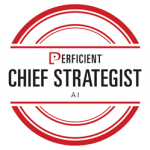Artificial intelligence (AI) is a hot topic. It’s everywhere, permeating culture well beyond the expected business settings. As a result, the increased visibility has created a general perception that AI is widely deployed and adopted today. But it’s actually not. Only four percent of CIOs have recently invested in or deployed artificial intelligence according to a 2018 Gartner survey. However, 46 percent have short-term to medium-term plans for implementing AI.
Business leaders have bought into the promise of the technology – 72 percent deem AI a “business advantage,” according to PwC. In this early adoption and high hype cycle, companies generally recognize they should pursue these types of advanced technologies. But they’re not always certain how to take full advantage of them.
Hence, our clients are asking:
- How does artificial intelligence drive value?
- Where will it be most useful?
- Where should I start?
Everyone’s deployment of AI will be different because it’s so specific to the business. Artificial intelligence is a wide open space, so don’t go blindly after use cases. First, you need to understand the value, natural progression, and logical order to training AI platforms. Then, you can leverage economies of scale if you train efficiently.
How to Set up for Success with Artificial Intelligence:
1. Select the Right Use Case
The biggest overall differentiator we’ve seen between success and failure with AI platforms is in the size and scope of the implementations. The clients that deploy the most successful AI solutions have taken bite-sized pieces and a more iterative approach rather than pursuing a big-bang solution.
Select a use case for your AI platform that’s big enough to drive value but small enough to deploy and realize value in a reasonable time frame. Take a slower, more strategic approach in the onset. That will position you for a better outcome and the ability to scale long term.
2. Get Your Data in Order
Secondly, determine whether you have sufficient data and time to deploy a full AI solution. You need data to be accessible, cleansed, and curated before you’re really ready to move forward.
3. Train Efficiently
Deploying an AI solution typically follows a natural progression, similar to training a new hire. Your users can benefit from economies of scale by identifying the areas of expertise and the order in which to train your AI system on those areas.
Optimizing training cycles is important. That’s especially the case when it involves highly paid subject matter experts who need to be extremely involved in setting up AI solutions. In healthcare, this includes physicians and nurses. In the legal space, that’s lawyers. Lastly, in financial services, it’s the financial advisors, the underwriters, the quantitatives. Use their time wisely to train in the technology. Avoid having to go back to the well.
4. Be Adaptable
AI solutions are developing rapidly. Consequently, a strategy created today can only realistically serve as a roadmap for the next six to 12 months. The technology will be vastly different by then. Leave room for iterations when you fully adopt AI. Be willing to adapt and evolve with the technology as it changes.
Want More Digital Transformation Advice?
My insights for this blog post draw from Perficient’s e-book, “How to Make Digital Transformation Gains in 2019.” In it, my fellow Perficient Chief Strategists and I share real-world examples from conversations with today’s leading brands at various stages of digital transformation. Our 10-chapter e-book features our business insights, actions to take now, and client success stories. Download it here or via the form below.
Next in the Series
This blog series is part of a special series inspired by our e-book. In the next post, Perficient Chief Strategist David Chapman discusses strategies for success in organizational change management.
Subscribe to our Digital Transformation weekly digest here to get the blog posts automatically delivered to your inbox every week. Or, follow our Digital Transformation blog for this series and advice on the topic from all of our thought leaders.
 About the Author
About the Author
Christine Livingston leads the Artificial Intelligence practice for Perficient, combining a background in analytics, unstructured content management, and case management to design and deliver transformative AI solutions.
Her engineering background aids her analysis of complex business problems and ability to develop innovative cognitive applications. Christine and her team help clients uncover hidden insights, identify trends, enhance existing applications, and scale their expertise.

